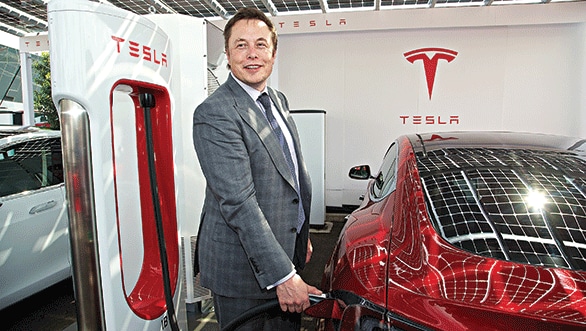As the once-unassailable dominance of Tesla in the European electric vehicle (EV) market faces stiff, rapid competition, Elon Musk is orchestrating a profound and strategic pivot. Faced with slumping vehicle sales across key regions, the company is reportedly moving away from merely selling high-tech vehicles to becoming an integrated energy supplier, beginning with a significant encroachment on the tightly regulated and established utility market in the United Kingdom. This maneuver is not just a diversification strategy; it is a fundamental redefinition of what Tesla is, aiming to transform the automaker into a comprehensive, decentralized energy giant.

The urgency of this shift is underscored by recent sales figures. Europe, once a "promised land" for Tesla's growth, is proving to be a highly competitive battleground. Data from July 2025 revealed alarming year-over-year drops in Tesla vehicle registrations across crucial markets: nearly 60% in the UK, over 55% in Germany, 47.7% in France, and a staggering 84% in Sweden. For a company that relies heavily on its vehicle division for revenue, this stagnation signals an urgent need for a new growth engine. The answer, surprisingly, is not a new car model, but kilowatt-hours.
The corporate world was sent into a buzz following the announcement on the UK energy regulator Ofgem's website: Tesla Energy Ventures, a subsidiary of the technological behemoth, has officially applied for a license to become a household and business electricity provider in the United Kingdom. Analysts widely believe that, given the application’s submission and the quiet recruitment of necessary personnel, Tesla’s full entry into the UK energy utility sector is imminent.
This strategic move is not without precedent. Since 2022, Tesla has successfully operated a similar service, "Tesla Electric," in Texas, USA. This model allows customers to optimize their energy consumption, charge their EVs during off-peak hours when electricity is cheapest, and—crucially—earn credits by selling surplus power stored in their home batteries back to the main grid. By replicating this model in the UK, Tesla is signaling a clear, aggressive strategy: to move beyond selling hardware (cars and Powerwalls) and establish a complete, integrated energy ecosystem that tightly links transportation, storage, and utility services.
The Virtual Power Plant (VPP): Tesla's Competitive Edge
The UK energy market is fiercely contested, dominated by established players like British Gas and Octopus Energy. Tesla’s confidence in disrupting this status quo lies in its unique technology and its existing customer infrastructure. Unlike traditional utilities that rely on centralized, costly power stations, Tesla's secret weapon is the concept of the Virtual Power Plant (VPP).
Tesla already has tens of thousands of Powerwall batteries installed in UK homes, coupled with hundreds of thousands of its EVs. The VPP model utilizes sophisticated software, notably the Autobidder platform, to link these distributed home batteries and vehicle battery packs together into a unified, decentralized power network. This network acts like a massive collective battery: it stores inexpensive electricity when supply is abundant (often from intermittent renewable sources like wind and solar) and rapidly discharges it back into the grid during times of high demand, when prices peak.
This VPP model allows Tesla to maximize profits while simultaneously offering compelling benefits to consumers. Homeowners can significantly reduce their utility bills, and potentially even earn money, by letting Tesla utilize the stored power in their batteries. The added competitive advantage is the immense loyalty of Tesla’s existing customer base. The ability to manage their car, solar panels, home battery, and now their entire electricity supply through one seamless app interface offers a level of convenience and integration that traditional, segmented utility providers simply cannot match.
Hurdles and the Musk Factor
Despite the technological sophistication of the VPP and the clear strategic potential, Tesla’s entry into the UK market faces significant challenges. Regulatory hurdles are high, as Ofgem remains highly cautious after the 2021 energy crisis led to multiple supplier bankruptcies. Tesla’s licensing process is likely to be meticulous and demanding. Furthermore, a practical limitation is that Tesla is only applying to supply electricity, while the majority of UK households also rely on gas for heating. This forces customers to maintain two separate utility contracts, potentially deterring mass adoption.
Perhaps the most unpredictable variable, however, remains Elon Musk himself. The billionaire’s increasing entanglement in polarizing social and political commentary poses a tangible reputational risk. The intense public scrutiny and division surrounding Musk could easily bleed from the automotive brand to the energy division, leading a significant segment of potential customers to choose a less controversial utility provider.
In conclusion, Tesla’s bold move in the UK is much more than a business expansion; it is a critical attempt to secure its future growth narrative by entering the trillion-dollar global energy sector. By shifting its focus from being a pure-play EV manufacturer to a vertically integrated power broker, Tesla seeks to create a robust, closed-loop ecosystem. The success of this gambit will determine if the energy market can indeed become the next explosive engine of growth needed to sustain the valuation of the world’s most ambitious technology company.


0 comments:
Post a Comment